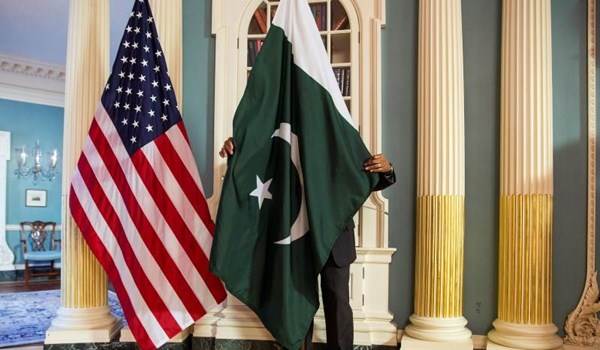US Suspends Military Training Program for Pakistan
 TEHRAN (Defapress)_The US military institutions are “struggling” to fill the 66 slots, which they had kept aside for Pakistani officers, for next academic year, the daily Dawn quoted anonymous sources as saying on Saturday.
TEHRAN (Defapress)_The US military institutions are “struggling” to fill the 66 slots, which they had kept aside for Pakistani officers, for next academic year, the daily Dawn quoted anonymous sources as saying on Saturday.
The move comes a few days after Pakistan and Russia signed an agreement to allow Pakistani military officers to receive training in Russian military institutions.
“The fund for training Pakistani officers came from the US government’s International Military Education and Training Programme (IMET) but no funds were made available for Pakistan for the next academic year,” the daily reported.
Pakistani officers have been receiving military training and education in the US since early 1960s, which were suspended in the 1990s. However, the US government restored the program after the September 11, 2001 terrorist attacks.
The US State Department also confirmed the suspension of Pakistan’s participation in the training programs.
“So far, Pakistan’s participation in 97 training programs total valued at $3.29M has been cancelled, to include 66 IMET courses worth $2.41M, 25 CTFP (Counter-Terrorism Fellowship Program) courses worth $843K, and 6 Regional Center courses worth $37K,” the State Department said in a statement.
However, it stressed that the US “continues to provide civilian assistance to Pakistan in line with US national interests”.
The Inter Services Public Relations, Pakistan army’s media-wing, has not yet commented on the reports.
On Thursday, Mohammad Faisal, the spokesman for Pakistan’s Foreign Ministry, declined to comments on the country’s current relations with US.
“I will not be commenting on the US Regarding Russia and Pakistan relations, our defence relations have grown steadily over the years and both countries have established regular military-to-military contacts,” Faisal told reporters.
Relations between the US and Pakistan deteriorated after US President Donald Trump assumed office last year, mainly because of a clash of interests in the war-torn Afghanistan.
On January 1, Trump in a tweet accused Pakistan of playing a “double game” and providing sanctuaries to Taliban factions fighting American troops in neighboring Afghanistan. The tweet was followed by an aid cut which escalated tension between the allies in the US-led war on terror.
Pakistan denies the charge saying it has already done “a lot” in war against terrorism, and will continue to do that but only in its own interest.
Security and political analysts in Pakistan termed the US move as a “short-sighted decision” and said it would not impact the capacity of Pakistan armed forces.
“It is a short-sighted and an imprudent decision. Such cooperation is more useful for the host nation and I think it will drive Pakistan further into the Chinese and Russian spheres,” Brig. (retired) Mohammad Saad, an Islamabad-based defense analyst, told Anadolu Agency.
Prof. Ijaz Khan Khattak, a Islamabad-based political analyst, said the US is using tactics to bring Pakistan under pressure to help them in the war-torn Afghanistan.
“I think US is not satisfied from Pakistan’s cooperation in Afghanistan and they are using these tactics to put pressure on Pakistan to help them in Afghanistan,” Khattak added.
On Tuesday, Pakistan and Russia signed an agreement at their first Joint Military Consultative Committee (JMCC) meeting at Pakistan’s military headquarters in Rawalpindi.
Under the agreement, Pakistani troops will receive training at the Russian military training institutes.
“Pakistan and Russia have been successful in developing a strong partnership, which is based on mutual trust, commonality of interests and convergence of views on important global and regional issues,” the spokesman for Pakistan’s Foreign Office said.
“The two countries have been able to construct a positive trajectory in sustaining high-level interactions and exploring new avenues to cement bilateral relations in all spheres including the defense sector,” he added.
